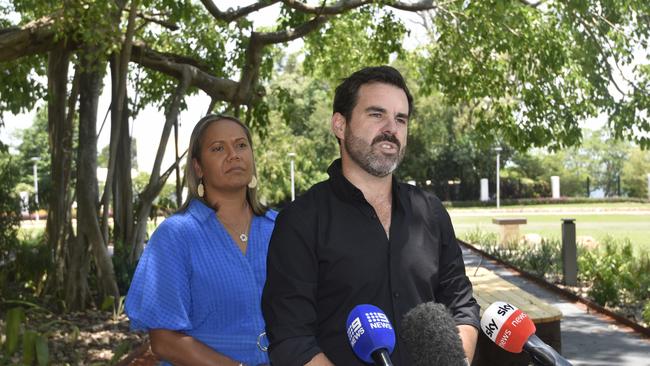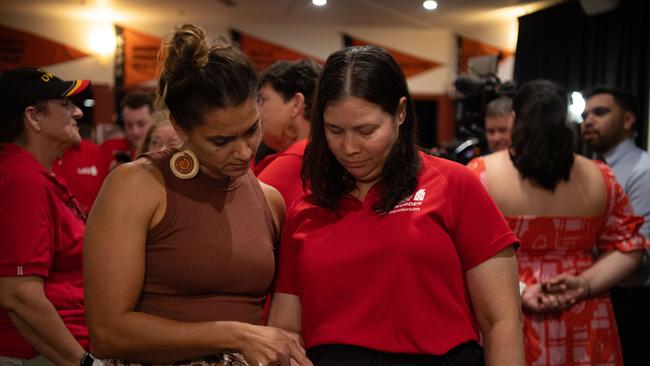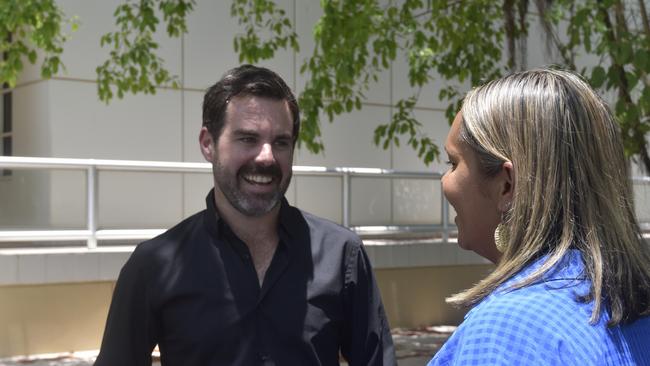Chansey Paech reflects on referendum loss, discusses ATSIC legacy ahead of NT parliament
Shadow Attorney-General Chansey Paech says the failed Voice to Parliament referendum played “a role” in the election result, maintaining voters were “disenfranchised” heading to the ballot box.

News
Don't miss out on the headlines from News. Followed categories will be added to My News.
A “large number” of Territorians “felt disenfranchised” heading into the NT election, Shadow Attorney-General Chansey Paech claims, maintaining remote communities were double-whammed following the failed Indigenous Voice to Parliament referendum a year ago.
This week marked exactly one year since Australians overwhelmingly rejected the Voice, with more than 60 per cent of Territorians voting ‘no’.
Outside Parliament House on Monday, Mr Paech, who supported the referendum, reflected on the landslide defeat.
“I certainly want to take time to acknowledge the result – we heard loudly and clearly here in the Northern Territory, regardless of how the referendum went, that Aboriginal people in remote communities voted for change, with Aboriginal Territorians in remote locations overwhelmingly voting in favour of a different way of doing things,” he said.
“There is an opportunity to work together as the 15th assembly to look at how we empower the voice of First Nations Territorians to make sure they are involved in decision making here in the Territory.”

Mr Paech confirmed he did believe the referendum played “a role” in the NT election result.
“I think a large number of Territorians felt disenfranchised at the most the recent Territory election, particularly in remote locations where they had really come out and supported the voice to only have that denied,” he said.
“So I think absolutely that did play a role (but) not the entire of the election outcome.”
Discussing how the Territory could move forward, Mr Paech revisited the past, paying tribute to the legacy of the Aboriginal and Torres Strait Islander Commission, which dissolved in 2005.
“I certainly acknowledge in my electorate lots of people talk about the good things that were involved in ATSIC,” he said.
“I want to acknowledge right from the start that ATSIC did have some issues, but it also provided a platform for many Aboriginal people to be involved at a grassroots level, a decision making level and shape and have input over appropriations and budgetary investments and expenditure in their local communities.”

Established in 1990, ATSIC was the peak body responsible for the welfare of Indigenous Australians before it was scrapped by the Howard Government in 2005 following allegations of criminal conduct.
Mr Paech, however, said ASTSIC had delivered positive results.
“When you actually look across the bush, particularly in a large number of homelands and remote communities, a lot of infrastructure that you see there is result of ATSIC,” he said.
“I think establishing something similar to ATSIC, whether it’s a regional assembly, or something of that nature, where people can be more involved and more hands on in having a greater say around where the money goes and what the priorities are will be really important to overcoming Aboriginal disadvantage here in the Territory.”





